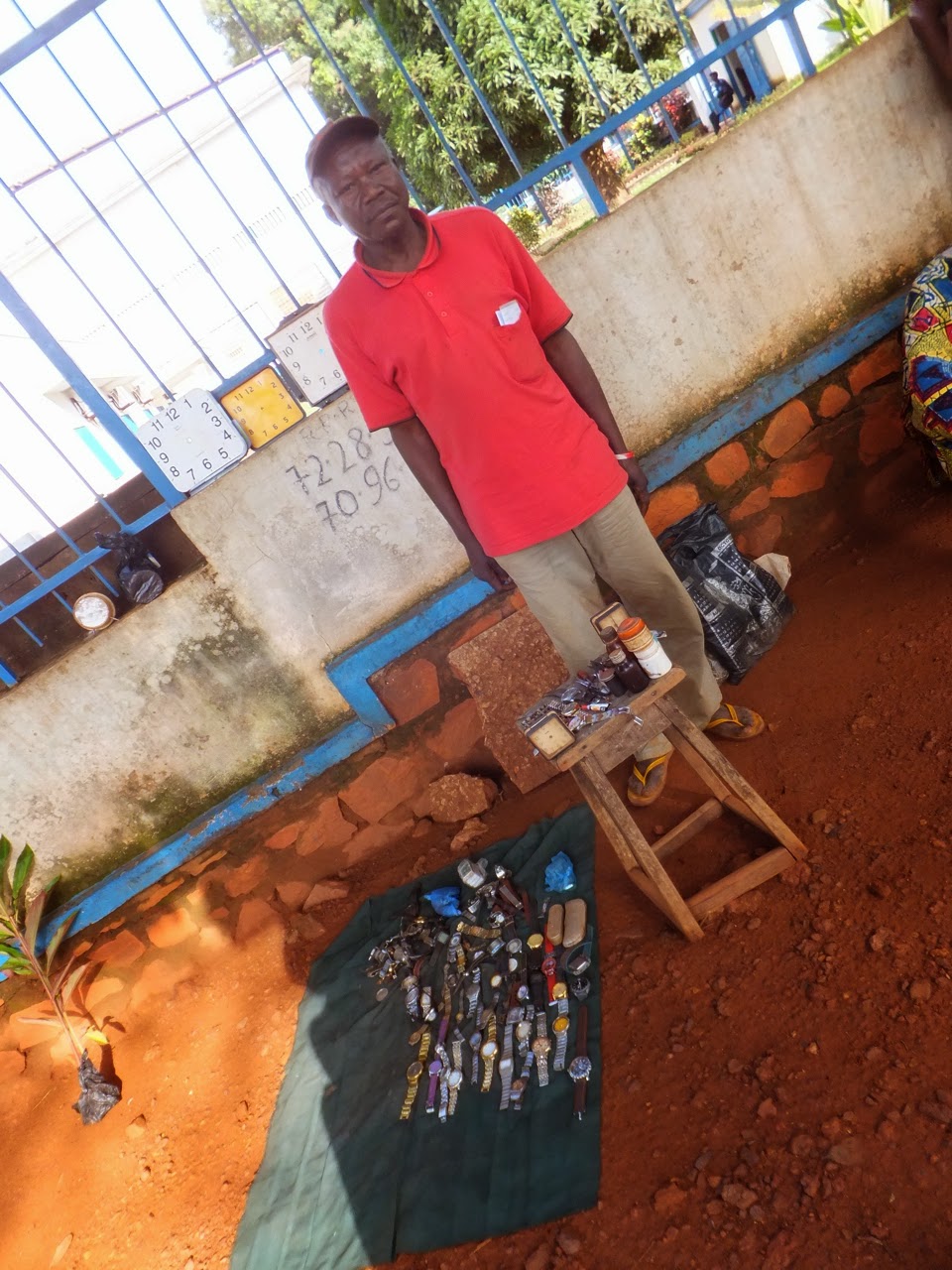Central African Republic... how could a place, a country, could get this unfriendly for living...
中央アフリカ共和国・・・どうしたらある場所が、一つの国が、これほど住み辛くなれるのだろう・・・
I want to share his story.
I forgot to ask his name, but he was a "watch man" who had his small stand one minute away from my office. So I used to greet him every morning on my way to the office. Sometimes we chatted for a minute or two, and I learned that he has 15 children-- 6 son and 6 daughters (?? they don't add up to 15... ), and some of his children had died young. He said he walked everyday from his neighbourhood which must be around 7km away.
When the insecurity got heightened, I could not go to the office. After two weeks or so, I saw him at his usual place, and we greeted. I was happy to see him again. I asked him if everything was all right, and he replied, no. Apparently, he no longer had his wooden stand. All the used watches on sale were lying on a cloth laid on dirt street. He told me that that Thursday afternoon, when we were told to leave the Office quickly due to the fighting nearby, his stand was taken away by armed men. Then he took his cap away, and showed me a bruise on top of his head, and a trail of blood inside his cap. Around the same time, he was stopped by "armed men" who took his telephone etc. away and hit him to bleed, in his neighbourhood. He said he was treated at a nearby clinic ran by MSF.
This man, who was making his life out of a modest watch repairing/selling business, had no reason to be deprived of his right to work, right to protection, and the right for the most basic human respect.
I wanted to support him but didn't know how to (I didn't want to just give out money). So I asked him how much it would cost him to buy a new stand to put the watches, and gave him that amount. I also picked the yellow clock, and asked him to repair it for me. The guard who was accompanying me whispered why I did not buy a new clock in a nearby supermarket ran by a Lebanese, that they would be nicer. I told him that I wanted to support this man's business, and he nodded.
So I have with me now this yellow clock. Not that I really like the style, but as a reminder of how difficult the life is for many people in this continent, and of their courage, and smile, despite the bitterness they bite, maybe today, again.
I forgot to ask his name, but he was a "watch man" who had his small stand one minute away from my office. So I used to greet him every morning on my way to the office. Sometimes we chatted for a minute or two, and I learned that he has 15 children-- 6 son and 6 daughters (?? they don't add up to 15... ), and some of his children had died young. He said he walked everyday from his neighbourhood which must be around 7km away.
When the insecurity got heightened, I could not go to the office. After two weeks or so, I saw him at his usual place, and we greeted. I was happy to see him again. I asked him if everything was all right, and he replied, no. Apparently, he no longer had his wooden stand. All the used watches on sale were lying on a cloth laid on dirt street. He told me that that Thursday afternoon, when we were told to leave the Office quickly due to the fighting nearby, his stand was taken away by armed men. Then he took his cap away, and showed me a bruise on top of his head, and a trail of blood inside his cap. Around the same time, he was stopped by "armed men" who took his telephone etc. away and hit him to bleed, in his neighbourhood. He said he was treated at a nearby clinic ran by MSF.
This man, who was making his life out of a modest watch repairing/selling business, had no reason to be deprived of his right to work, right to protection, and the right for the most basic human respect.
I wanted to support him but didn't know how to (I didn't want to just give out money). So I asked him how much it would cost him to buy a new stand to put the watches, and gave him that amount. I also picked the yellow clock, and asked him to repair it for me. The guard who was accompanying me whispered why I did not buy a new clock in a nearby supermarket ran by a Lebanese, that they would be nicer. I told him that I wanted to support this man's business, and he nodded.
So I have with me now this yellow clock. Not that I really like the style, but as a reminder of how difficult the life is for many people in this continent, and of their courage, and smile, despite the bitterness they bite, maybe today, again.
名前を聞くのを忘れていたことに今更気付いたが、その人は、私の事務所から一分離れた道路上に小さなスタンドを構え、時計の修理と古時計を売る、「時計おじさん」だった。大抵朝、通りかかる際、お早うと挨拶をして、たまに1—2分話をすることもあった。彼には子どもが15人、息子6人と娘6人いて(ん、足し算が合わないぞ・・・)、何人かは幼い時期に亡くなってしまったそうだ。毎朝住んでいる界隈から歩いて来るそうだが、おそらく7km程の距離であろう。7kmも歩いて自分の「仕事場」来たところで、一日何人の客が彼のところに時計修理に来るのだろうか、また壊れかけたような古時計は、一体売れるのだろうか、一銭の収入もない日、彼はどんな気持ちで再び同じ道を歩いて帰るのだろうか・・・などと余計な心配をせずにはいられなかった。
バンギの治安が悪化し、私達は事務所に行けなくなった。約2週間後、いつもの場所で「時計おじさん」を見かけ、嬉しくなった。同時に気が引けるけど聞かずにはいられない質問を投げた:「ここのところどうでしたか?」彼は首を振った。実際、彼の木のスタンドは姿を消しており、古時計は赤土の地面に敷かれた布の上に並べられ、古いボトルやマッチ箱に入れられた修理用具は、彼が以前座っていた小さな木の椅子に混み合いながらも置かれていた。時計おじさんは、目を細くして、この2週間の間に起こったことを話してくれた。あの木曜日の午後、事務所付近の治安悪化のため私達が速やかに帰宅するように指示されたころ、おじさんの小さなスタンドは武装された男たちに取り去られてしまったそうだ。続けて、おじさんは、かぶっていた帽子を脱いで、頭上のこぶと傷を指差し、さらに帽子の内側を見せてくれた。色が褪せてきている血の跡だった。同じ週、おじさんの住む界隈で、「武装した男たち」はおじさんを立ち止め、携帯電話等を取り上げられたうえ、棒で打ち叩いて去っていったそうだ。おじさんはMSFが運営する近所のクリニックで怪我の手当を受けたそうだ。
小さな時計修理スタンドで生計を立てているこのおじさんが、なぜ働く権利、(暴力から)保護される権利、そして最も基礎的な人間の尊厳を奪われなければならないのか。
何らかの手助けをしたかったけれど、単にお金を渡すのは避けたかったので、どうすれば良いか迷った。結局時計や道具を並べる新しいスタンドを買うにはいくら位かかるのか聞き、その額を手渡した。その額というのが、私が事務所の食堂で一日の昼食に使う額程だったので、再び苦い気持ちになった。同時に、黄色い壊れかけた掛け時計が目に入ったので、これを修理して売ってくれるように頼んだ。同行していた若い警備員が、何故レバノン人が経営する近くのスーパーで新品の時計を買わないんだ、そっちの方が物がいいよ、と耳元で呟いた。このおじさんの仕事を応援したいんだと呟き返したら、頷いていた。
という訳で、今私の部屋にはおじさんが修理してくれた黄色い時計がある。特に形や色が好きという訳ではないが、この大陸に生きる多くの人たちにとって「生きる」ということがどれだけ困難なのか、そして今日も味わっているかもしれない苦痛に屈せない彼らの勇気と笑顔を思い出させてくれるために。



